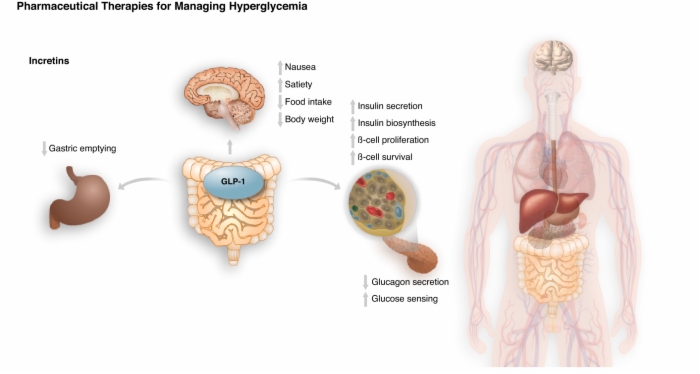SMi Source lesson Diabetes: Type 2 - Pharmaceutical Therapies for Managing Hyperglycemia - Incretins has the following microlearning topics
1. Pharmaceutical Therapies for Managing Hyperglycemia


Lesson Diabetes: Type 2 - Pharmaceutical Therapies for Managing Hyperglycemia - Incretins teaches these concepts
Diabetes, Pharmaceutical Therapies for Managing Hyperglycemia, Incretins, GLP-1
Diabetes, Pharmaceutical Therapies for Managing Hyperglycemia, Incretins
Lesson Diabetes: Type 2 - Pharmaceutical Therapies for Managing Hyperglycemia - Incretins addresses these key points
GLP-1:
- One of several cleavage products of proglucagon produced in the intestines.
- Secretion is stimulated after a meal.
- Half-life in circulation is less than 2 minutes.
- Acts on the stomach to delay gastric emptying and slow the absorption of nutrients.
- Binds in a glucose-dependent manner to GLP-1 receptor on pancreatic beta cells where it has multiple activities.
- Stimulates insulin secretion but also regulates transcription and translation of insulin messenger RNA.
- Long lasting effects in pancreas.
- Improves glucose sensitivity of beta cells.
- Promotes generation and proliferation of new beta cells.
- Enhances beta cell survival.
- Inhibits glucagon secretion from pancreatic alpha cells.
- Indirectly decreases hepatic glucose output.
- Acts in the brain to send signals to the stomach to promote satiety, reduce food intake, and decrease body weight.
Incretin GLP-1 analogues:
- More stable in circulation than endogenous GLP-1.
- Able to slow glucose absorption.
- Increase satiety.
- Potentiate glucose stimulated insulin secretion.
- Produce modest weight loss.
DPP-4 inhibitors:
- Extend the half-life of endogenous GLP-1.
- Similar biological activity to incretins.
- Advantage of oral administration.
- Lack activity on gastric emptying and satiety.
GIP:
- Acts on a G-protein-coupled receptor that is expressed widely in tissues throughout the body.
- Stimulates insulin secretion from pancreatic beta cells and promotes beta cell survival.
- Has not been effective when tested as therapy in patients with type 2 diabetes.
Incretins:
- Secreted rapidly into the circulation following ingestion of a meal.
- GLP-1 is produced by endocrine L cells of the distal ileum and colon.
- GIP is produced by K cells of the proximal duodenum and jejunum.
- These peptides rapidly appear and disappear from circulation.
- Part of a complex system of peptide hormones secreted by the digestive tract to modulate energy uptake and utilization.
- Act on multiple tissues to facilitate glucose uptake and reduce endogenous glucose output.
- Gastrointestinal tract not only digests foods and absorbs nutrients, but also plays an important role in the regulation of energy homeostasis and glycemic control.
- Enteroendocrine cells of the stomach and intestines secret peptide hormones that act throughout the body to regulate energy intake and glucose homeostasis.
Lesson Diabetes: Type 2 - Pharmaceutical Therapies for Managing Hyperglycemia - Incretins introduces and defines these terms
GLP-1 - Glucagon-Like Peptide-1
GIP - Glucose-Dependent Insulinotropic Polypeptide